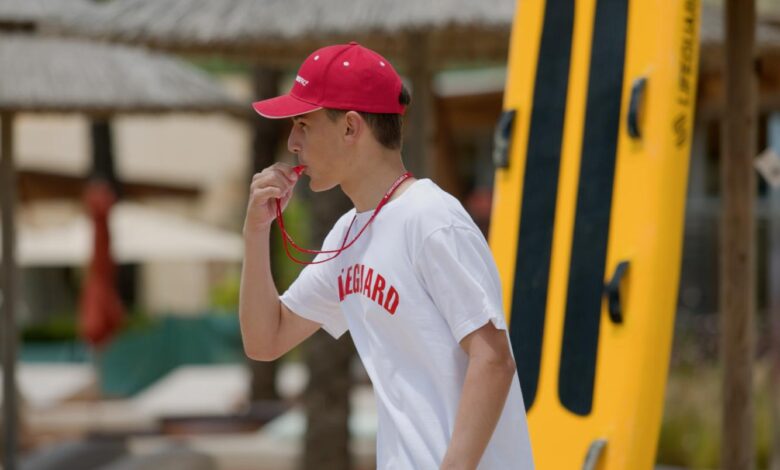Becoming a Lifeguard: A Lifestyle Change

Becoming a lifeguard isn’t just about learning skills; it’s a finished shift in lifestyle. From how you view safety to your everyday routines, being a lifeguard influences different parts of your life.
Wellness and Health
One significant change as a lifeguard is focusing on wellness and health. Regular exercise schedules become crucial, for appearance as well as for maintaining the physical stamina expected for rescues. Lifeguards frequently consolidate swimming, strength training, and cardio exercises into their routines to remain in top condition.
Dietary Habits
Healthy eating becomes a concentration. Lifeguards frequently choose nutritious food sources to fuel their bodies really during extended periods on duty. This remembers adjusted feasts rich in proteins, natural products, vegetables, and entire grains, staying away from unnecessary low-quality food or sweet beverages that can obstruct execution.
Time Management
Overseeing time becomes essential. Adjusting work, training, and individual life requires cautious planning and organization. Lifeguards learn to focus on errands, distribute time proficiently, and adjust to evolving plans, improving important time usage abilities.
Responsibility
The responsibility of defending lives impacts dynamics in all parts of life. It cultivates a feeling of duty and responsibility, empowering lifeguards to pursue capable decisions at fill-in as well as in their own lives.
Social Life Adjustments
Public activity might change too. Ends of the week and occasions frequently mean working at the pool or beach, influencing social plans. Lifeguards learn to offset social commitments with work commitments, tracking down ways of remaining associated with loved ones regardless of their requesting plans.
Community Commitment
Lifeguards become essential pieces of their networks. They participate in safety education programs and community occasions, spreading mindfulness about water safety and crisis readiness. This contribution strengthens community security and supports the lifeguard’s role as a safety advocate.
Mental Readiness
Being mentally arranged is crucial. Lifeguards learn to keep even-tempered and centred in emergencies, a skill material to different life circumstances. This mental flexibility assists them with taking care of pressure, pursuing fast choices under tension, and keeping a cool head in testing circumstances.
Ceaseless Learning
The learning won’t ever stop. Lifeguards consistently update their skills through continuous training and certifications. They go to lifeguard classes close to them to upgrade their knowledge of water rescue techniques, CPR, first aid, and crisis protocols, guaranteeing they are constantly ready to deal with any circumstance.
Crisis Response Skills
Obtaining crisis response skills is fundamental. From CPR to first aid, lifeguards are prepared to deal with different emergencies, from minor injuries to life-undermining circumstances. This aptitude gives them the confidence to act unequivocally and really in emergencies, possibly saving lives.
The balance between fun and serious activities
Maintaining a balance between fun and serious activities becomes a need. Lifeguards learn to isolate from work during off-the-clock hours to re-energize mentally and physically. They take part in leisure activities, invest energy with friends and family, and seek after private interests to keep a healthy harmony between work and recreation.
Teamwork
Lifeguarding encourages teamwork. Working together with associates during drills and genuine circumstances assembles kinship and trust. Lifeguards learn to impart successfully, coordinate actions seamlessly, and support each other to guarantee a protected and effective response to emergencies.
Safety Mindfulness
Safety mindfulness becomes natural. Lifeguards instinctually survey risks and go to preventive lengths both on and off the clock. They stay watchful, filtering their environmental factors for possible dangers and finding a way proactive ways to limit risks and guarantee a protected environment for everybody.
Confidence and Initiative
Lifeguard training imparts confidence and administration skills. Lifeguards learn to assume responsibility in emergencies, delegate undertakings really, and guide others with power and clearness. This authority capacity stretches out past the pool deck, engaging lifeguards to assume roles of liability and impact in different parts of their lives.
Flexibility
Flexibility is critical. Lifeguards should adjust to changing atmospheric conditions, crowd elements, and startling difficulties. They learn to think and react quickly, make speedy acclimations to plans, and stay adaptable in their way to deal with guaranteed successful lifeguarding tasks in any circumstance.
Professionalism
It is foremost to Keep up with professionalism. Lifeguards maintain exclusive requirements of direct and execution consistently. They show regard for their partners, supporters, and facilities, sticking to protocols and strategies to guarantee a protected and professional environment for everybody.
Career Development
Lifeguarding offers opportunities for career development. Progressing to administrative roles or becoming coaches are normal movements. Lifeguards can seek extra certifications, like water safety educator or lifeguard teacher, extending their skill set and opening ways to new career pathways inside the aquatic business.
Final Word
Becoming a lifeguard isn’t just about learning to save lives; it’s a lifestyle change. From wellness and responsibility to initiative and career development, lifeguarding includes an all-encompassing way to deal with safety and community administration.
If you’re thinking about this way, search for lifeguard classes near me and seek lifeguard certification through respectable organizations like the American Lifeguard Association. Embrace the difficulties and compensations of lifeguarding, realizing that you’re having a constructive outcome on lives and networks while encountering self-awareness and satisfaction.

